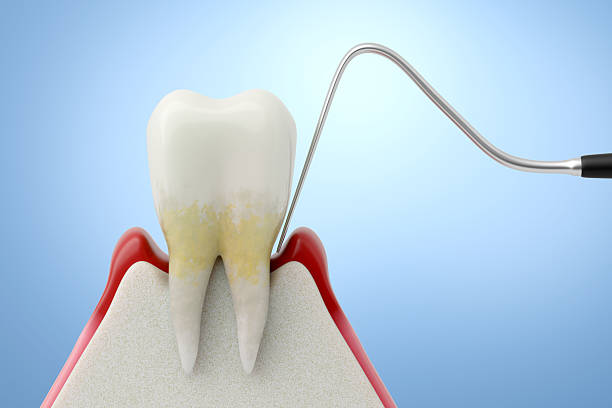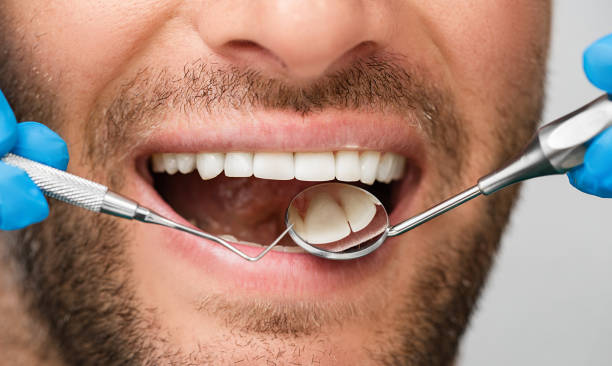

Periodontal disease, commonly referred to as gum disease, is a serious condition that affects the gums and the supporting structures of the teeth. While it may begin as mild inflammation, if left untreated, it can progress to more severe forms, leading to tooth loss and other health complications. At Fernandez, DMD, we believe in educating our patients about the importance of periodontal health and providing effective treatment options to maintain a healthy smile.
Periodontal disease occurs when bacteria build up along the gum line, causing inflammation and infection. It typically starts as gingivitis, the earliest stage of gum disease, characterized by redness, swelling, and bleeding during brushing or flossing. Gingivitis is often reversible with proper oral hygiene and professional dental care.

If gingivitis is not addressed, it can progress to periodontitis. In this more advanced stage, the infection spreads below the gum line, damaging the bone and connective tissue that support the teeth. As the disease advances, pockets can form between the gums and teeth, making it easier for bacteria to accumulate. Without intervention, teeth may become loose and eventually be lost. Periodontal disease has also been linked to systemic health issues, including heart disease, diabetes, and respiratory problems, highlighting the importance of early diagnosis and treatment.
Recognizing periodontal disease early can make a significant difference in treatment outcomes. Some common signs and symptoms include persistent bad breath, swollen or tender gums, bleeding while brushing or flossing, gums that appear to pull away from the teeth, loose or shifting teeth, and changes in the way your teeth fit together when biting. Patients may also notice increased tooth sensitivity or discomfort when chewing.
Even if symptoms are mild or not noticeable, routine dental exams are critical for early detection. Many patients do not realize they have periodontal disease until it has progressed significantly, which is why regular check-ups are essential.

The type of treatment recommended depends on the severity of the condition. For early-stage gum disease, non-surgical treatments are often sufficient. Scaling and root planing, sometimes referred to as a deep cleaning, is a common non-surgical approach. This procedure involves carefully removing plaque and tartar from above and below the gum line and smoothing the tooth roots to help the gums reattach to the teeth.
In more advanced cases, surgical treatments may be necessary. Flap surgery, for example, allows the dentist to lift back the gums to remove tartar from deep pockets and then reposition the gums for optimal healing. Bone and tissue grafting procedures can also help restore areas damaged by periodontitis. These treatments aim to stabilize teeth, reduce pocket depths, and promote the regeneration of healthy gum tissue and bone.
Laser therapy is another option that has become increasingly popular for treating periodontal disease. This minimally invasive approach uses focused light to remove diseased tissue and bacteria while promoting healing. Laser therapy may result in less discomfort and faster recovery compared to traditional surgery, though it may not be appropriate for every patient.

Treatment alone is not enough to fully control periodontal disease. Maintaining good oral hygiene at home is crucial for preventing recurrence and supporting long-term dental health. Brushing at least twice a day with a fluoride toothpaste, flossing daily, and using an antimicrobial mouth rinse can help reduce bacterial buildup. Patients should also be mindful of their diet, limiting sugary and acidic foods that can contribute to plaque formation.
Regular dental visits are equally important. Professional cleanings help remove plaque and tartar that cannot be eliminated with routine home care. Your dentist can also monitor the health of your gums, measure pocket depths, and adjust treatment plans as needed. Patients with a history of periodontal disease may benefit from more frequent dental appointments to ensure the condition remains under control.
Several lifestyle factors can influence the progression of periodontal disease. Smoking and tobacco use are major contributors to gum disease, as they impair blood flow to the gums and hinder the body’s natural healing processes. Quitting smoking can significantly improve oral health and enhance the effectiveness of periodontal treatment.
Other factors, such as stress, certain medications, and systemic health conditions, can also impact gum health. Stress can affect the immune system, making it harder for the body to fight off infection, while some medications may reduce saliva production, increasing the risk of bacterial growth. Chronic conditions such as diabetes can make periodontal disease more severe and harder to manage. Discussing your medical history with your dentist helps ensure that treatment plans are tailored to your unique needs.
Early intervention is the key to preventing irreversible damage caused by periodontal disease. When addressed promptly, gum disease can often be managed effectively with non-surgical treatments and consistent home care. Delaying treatment allows the infection to progress, increasing the likelihood of tooth loss and the need for more invasive procedures.
Patients should not wait for discomfort or obvious symptoms to seek care. Even in the absence of pain, regular dental exams and cleanings are essential for detecting early signs of gum disease and maintaining overall oral health. Educating yourself about the condition, its risk factors, and preventive strategies is an important step in protecting your smile.

Managing periodontal disease requires a partnership between the patient and dental professional. At Fernandez, DMD, we take the time to thoroughly assess your oral health, explain treatment options, and answer any questions you may have. Our goal is to provide personalized care that addresses the root cause of the problem, not just the symptoms.
We encourage patients to be proactive about their oral health. If you notice any changes in your gums, experience bleeding while brushing, or have concerns about your dental hygiene routine, reach out to your dentist promptly. Early evaluation can help prevent complications and ensure that your treatment plan is both effective and minimally invasive.
Periodontal disease is a common but serious condition that can have long-term consequences if left untreated. Understanding the causes, recognizing the signs, and seeking professional care are essential for maintaining healthy gums and teeth. At Fernandez, DMD, we are committed to providing comprehensive periodontal care tailored to your individual needs. From early detection to advanced treatment options, we are here to help you achieve optimal oral health.
If you are concerned about your gum health or would like to schedule a consultation for periodontal treatment, contact us today. We are located at 502 E. Olympia Ave., Punta Gorda, FL 33950, and can be reached by phone at 941-639-1124. Taking the first step toward healthier gums can protect your smile for years to come.
